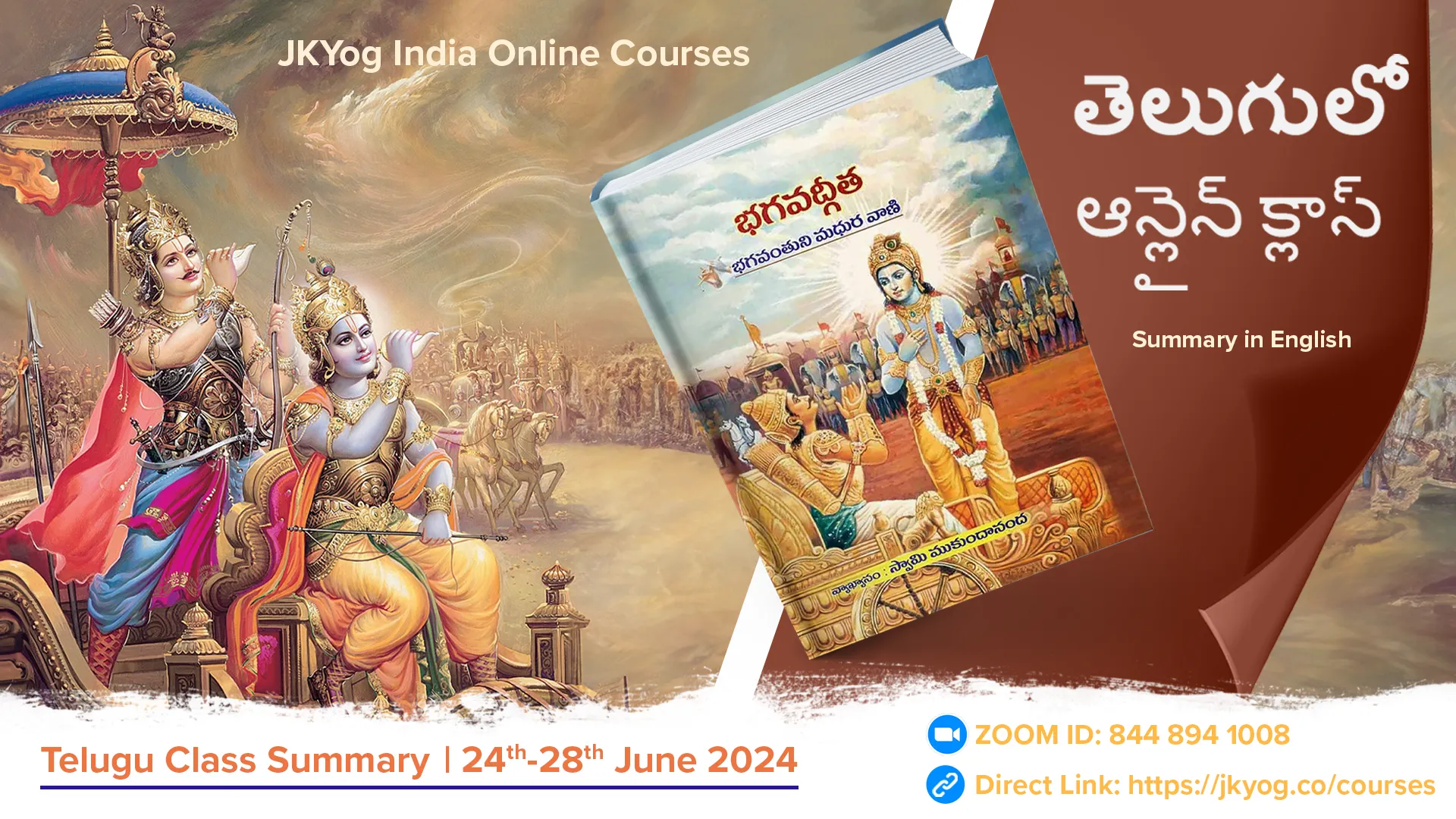The Context:
In Bhagavad Gita Chapter 2, verses 16 to 30, Shree Krishna teaches Arjun that our existence, as He teaches, is not this impermanent body but the eternal Self. Death is to the body but not to the soul, and the soul is to be killed by no one and is indestructible. The soul renounces the lifeless body as the man renounces the ragged clothes.
Excerpts from verses 31 to 33:
O Arjun! You should not hesitate to fight according to your Kshatriya dharma. Kshatriyas have no other duty than to fight for the protection of Dharma.
Kshatriyas who get the opportunity to protect Dharma are very fortunate. Such an opportunity is like an open heaven for them.
Abandoning duty and fame and not fighting for righteousness is like committing a sin.
There are two kinds of dharma- Spiritual and physical.
- Spiritual Dharma: The nature of sugar is sweet, and the nature of fire is hot.
- Physical Dharma: It depends on the physical activity of the body. It unites man with society and harmonises the needs of individuals and society.
While discussing verses 34 to 38, it is important first to understand the greatness of Arjun.
Arjun is a great warrior and rival who can compete with Karna, Bhishma, Dronacharya, etc. By fighting with them, he has won the admiration of many gods, including Bhagwan Shiva, who granted Arjun his power weapon- Pashupatastra, disguised as a hunter.
Dronacharya, Arjun's archery teacher, has also blessed him with the Brahmasirsha Shastra.
In order to destroy the illusion of Arjun in the war zone, Shree Krishna says the following.
Excerpts from verses 34 to 39:
People will call you a coward and a runaway soldier. This reproach is worse for you than death.
You will lose your honour by being called a fugitive from the battle by the great men in whose eyes you are great.
Your enemies will insult you with cruel words and diminish your greatness. Is there anything worse than this?
O Arjun! He who dies in battle attains heaven, and he who is victorious attains the kingdom. So be prepared for war.
Carry out the duty considering pleasure and pain and profit and loss equally. If you do your duty in this way, you will not sin.
So far, I have explained Sankhya Yog, the analytical knowledge of the Self.
Oh dear! Now, I will explain Buddhi yog. When you work with this awareness, you will be liberated from the bondage of karm.
Additional information:
If there is any doubt as to why this change in discourse from Sankhya Yog to Buddhi Yog- since Arjun is in an illusionary state of mind in which he cannot fulfil his duty, forgetting that this world and human beings are impermanent, it must be understood that Shree Krishna, the Lord of the universe and the Guru of Arjun in Kurukshetra, considers Buddhi Yog to be an appropriate form of knowledge.
It is very difficult to attain salvation through Sankhya Yog. Gautam Buddha, who sees all the riches and material comforts, gets enlightenment after seven years of meditation.
Different gurus, such as Shankaracharya, Ramanujaacharya, and Madhvacharya, explain the philosophy of the soul in different ways based on the circumstances of time and place.
Everything mentioned above is theoretical; practical knowledge comes only when we constantly meditate on theoretical knowledge. Knowledge is both verbal and experiential. An excellent example of this is coal and diamond. Coal that has been under immense pressure and heat for centuries and millennia turns into diamonds.
Practice is required to turn theoretical knowledge into practice. So we should meditate, serve, and be in the company of good people (we should be in satsang).
Excerpts from verses 40 to 46:
There is no loss or adverse effect when one works with this knowledge (in Karm Yog). Even a little practice can save one from great dangers.
The minds of those who are in Karmyog are stable, but the minds of those who are not in Karmyog are unstable.
Those who have limited knowledge of Karmyog perform pompous rituals to attain opulence, sensual pleasures, higher birth, and heavenly abode without a perfect understanding of the Vedas.
Therefore, they do not have the determination to succeed in the path of God-realization.
Shree Krishna says, "Arjun, the Vedas describe the threefold spiritual aspects of material nature. Beyond these three qualities, you are self-conscious if you are in a pure spiritual state."
Just as a small well flows into a lake, in the same way, all the goals of the Vedas are fulfilled by those who are blessed with the knowledge of the Supreme Truth.
Suggestion:
For an introduction to the Vedas and to understand the relationship between the Vedas and the Bhagavad Gita, please read the Bhagavad Gita – The Song of God, Swami Mukundananda's commentary on Chapter 2, verses 45 and 46 of the Sankhya Yog.
Next week:
- If we follow the path of self-realisation, what changes will occur in us?
- What can we expect from God?
- What was the change in Arjun, who the Lord directly taught? What doubts did Arjun get after listening?
To answer such questions and understand more about the Bhagavad Gita, join the Bhagavad Gita Dialogue in Telugu every Monday to Friday from 7:30 to 8:30 AM IST. If you cannot attend the sessions, please read this blog again next week.
Summary: JKYog India Online Class- Bhagavad Gita [Telugu]- 24 June to 28 June 2024








